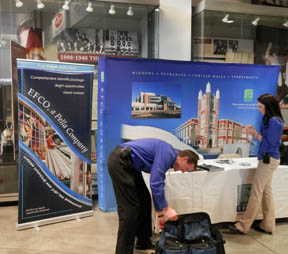
If you’ve never been to a career fair, the first time you attend can feel overwhelming.
In front of the check-in tables you’ll probably see students forming lines to fill out name tags and pick up event literature. Some students may form clusters with people they know, while other individuals stand by themselves as they look at the literature and try to figure out what to do. You may overhear students asking as they pick up information on the participating companies and organizations, “How does this work? Do I just walk around? Where do I start?”
The Missouri State University Career Center will be hosting a campus-wide career fair on Wednesday, September 25, from noon until 4:00 p.m. in the JQH Arena. All students and alumni from all majors are invited to attend.
Here are some tips to help you navigate a career fair.
What Should I Do BEFORE the Career Fair?
Don’t wait until the last minute to get ready for the career fair. Instead, prepare several days in advance by readying your résumé, selecting your clothes, and researching employers.
Is Your Résumé Ready?
Make sure your résumé has been well developed and proofread. Print it on quality résumé paper, and bring plenty of copies to distribute to employers. If you run out of copies, you may not have easy access to a printer or copier to make more.
Have You Selected Appropriate Attire?
Before employers even speak to you, the first thing they notice is your look. If you’re dressed too casually, you may send the message that you also have a casual attitude about working. Select clothing that is appropriate. Does this mean you should wear a suit? You definitely will see many students wearing suits, but business casual is often acceptable at career fairs. Business casual for this purpose is typically trousers/khakis and shirt with collar (for men) and trousers/skirt and blouse/shirt with collar (for women); NO jeans, NO athletic wear.
The answer depends upon the companies/organizations you’re targeting. If the companies that you’re pursuing are more laid back, then business casual is fine, but if they’re more conservative, then your attire should match.
For female job seekers, don’t wear skirts that are too short or too tight. Avoid tops that are too revealing—exposing too much cleavage or showing your bra/bra straps. In her column, “TV Shows Send Mixed Messages on Workplace Fashion,” (http://goo.gl/xKEkoc) Megan Pearl expresses the importance of finding a balance between wearing the latest trend and dressing the role of a professional.
Career fairs typically demand a lot of walking and standing, so make sure your shoes are comfortable. Stilettos may be more appropriate for a date, and flip-flops are too casual. If your shoes are new, make sure you’ve worn them enough to break them in before you wear them to the career fair.
Do You Know Which Employers Are Attending?
Visit the Career Center’s website (http://careercenter.missouristate.edu/FallCareerFair.htm) to see the list of employers who are planning to attend. You can view their websites and learn about them ahead of time. That way, when you speak with the representatives, you will be knowledgeable of their organization and able to ask educated questions.
What Do I Do When I Arrive at the Career Fair?
The first thing to do when you arrive is to check in at the check-in table, where you can collect a nametag and information on the employers. Try to avoid lugging a backpack with you. Not only does it get in the way, but a backpack disrupts the professional impression you’re trying to make.
Because attending a career fair can be somewhat intimidating, often students want to cling to their friends and approach employers in a herd, but this should be an individual activity. You want to distinguish yourself with the employers you meet. You don’t want to seem fearful or unable to talk to them on your own without the support of your friends.
Although you should research the employers ahead of time to determine those you definitely want to target, also take the opportunity to explore opportunities with employers you may not have considered. You may discover organizations that are a good match for your interest and skills.
Introduce yourself to the employer and give your best handshake (firm but not bone crushing). Make eye contact, smile, and be polite. Be prepared to discuss your career objectives, strengths, skills, interests, and how you would benefit their company. Find out if they’re collecting résumés, what their application process is, and if there are other recruiters or hiring managers you should speak with. Be sure to thank the employers for their time and, if possible, collect their business cards. If they don’t have a business card, then take note of their contact information.
What Happens AFTER the Career Fair?
Follow up as soon as possible (within a week) with those employers that interest you. Send an email message in which you thank them again and express your qualifications and interest.
The career fair can be an opportunity to learn about companies and organizations, make contacts with employers, and potentially have an on-the-spot interview that could lead to a second interview. When you’re looking for an internship or full-time position, attending a career fair could provide you with the connections you need.
